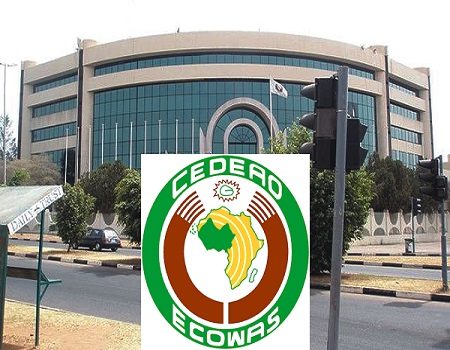As predicted by stakeholders in the agricultural sector, the COVID-19 pandemic has become a threat to not just Nigerian agriculture, but to the global food supply.
In the early stage of lockdown as a measure to contain the spread of COVID-19, stakeholders raised alarm over the looming food crisis if proper steps were not taken to get farmers back to the farm.
Following the fallout of the COVID-19 lockdown, the Economic Community of West Africa States (ECOWAS) in conjunction with its Donors and Financial Partners has freely donated 3.399 Metric Tons (MT) worth of cereals as humanitarian assistance to support the most vulnerable populations towards mitigating the effect of COVID-19 Pandemic in Nigeria.
The 3.399 MT of cereals donation by ECOWAS was received on behalf of the Federal Government by the Minister of State for Agriculture and Rural Development, Hon Mustapha Baba Shehuri.
Recall that the Director-General of the Food and Agriculture Organisation of the United Nations, QU Dongyu, called for immediate actions to minimise disruption to food supply chains following the lockdown.
In a statement titled ‘Keeping global food chains alive is crucial amid COVID-19 crisis’, QU Dongyu said coherent response is needed globally to prevent the outbreak of Coronavirus from triggering food crisis.
“To reduce the risk of an even greater toll – shortage of food for millions, even in affluent countries – the world must take immediate actions to minimise disruptions to food supply chains.
“A globally coordinated and coherent response is needed to prevent this public health crisis from triggering a food crisis in which people cannot find or afford food.
“For now, COVID-19 has not entailed any strain on food security, despite anecdotal reports of crowded supermarket sieges.
ALSO READ: Akeredolu inaugurates newly elected Council Chairmen in Ondo
“While there’s no need for panic – there is enough supply of food in the world to feed everyone – we must face the challenge: an enormous risk that food may not be made available where it is needed”, he said.
Also, the President of Alliance for a Green Revolution in Africa (AGRA), Dr Agnes Kalibata, has cautioned that the outbreak of COVID-19 shouldn’t lead to a food crisis in Africa.
Dr Kalibata said though the movement restriction imposed in some African countries is a step towards curbing the spread of the disease, the implication on food production should also be considered.
She said already 250 million people in Africa are without food, and these set of people would suffer from both the long and short-term effect of the pandemic.
Dr Kalibata in an article made available to journalists said “each of the 14 countries that AGRA partners with, has imposed some degree of restrictions to protect the populations from the spread of the virus.
She said as efforts were being made to slow the spread of the disease, there is a need to make efforts to ensure people have food, else, the food crisis is imminent.
While receiving the cereals at the handing over ceremony at the Grain Depot at Hotoro, kano in Kano State over the weekend, the Minister stated that ‘’Nigeria has taken notice of this kind gesture by ECOWAS. Be rest assured that the 3,999 MT of cereals will be distributed to vulnerable populations affected by the negative impact of COVID-19, terrorism, inter-community conflicts and drought.”
Baba Shehuri informed that ‘’the Federal Government through the Ministry recently released 70,000 MT of assorted grains from its strategic grains reserves to cushion the effect of COVID- 19 pandemic.”
The Minister stressed that ‘’in order to address the incessant worrying food crisis in the West African Sub-region especially the Sahel, the Heads of Government of ECOWAS member states decided to set up Regional Food Security Reserve (RFSR) Programme.”
Shehuri further said that “this necessitated the signing of Contract Agreement between ECOWAS and the Ministry’s Department of Food & Strategic Reserve on July 72017. This includes keeping a substantial quantity of food in her Food Reserve that can be used for interventions in case of emergencies and to boost food security within the ECOWAS member states.”
He noted that “the Government of Federal Republic of Nigeria loaned 5,000MT of assorted grains from ECOWAS Stock which was agreed to be paid back on grain for grain basis.”
He explained that “modalities had been put in place to replace the ECOWAS Stock before the advent of COVID-19 Pandemic. That notwithstanding, I can assure you that the Stock will be replaced in due course.”
Shehuri thanked the ECOWAS, Developmental Partners and Kano State Government for their contribution and support towards averting food crisis in Nigeria and West Africa region in general.
In his remarks, the ECOWAS Commissioner for Agriculture, Water Resources & Environment, Mr Sangare Sekou said that ” in compliance with the Management rules adopted by the Member States, food from the Regional Food Security Reserve alongside with national governments efforts, Countries with larger populations that are most stricken by food insecurity are ones chosen to receive food donation.”
Mr Sekou stated that those donations were directed to the most vulnerable populations living in Burkina Faso, the Republic of Niger, Mali and the Federal Republic of Nigeria, mostly in the North Region. He lauded the European Union, French Development Agency among others for technical and financial assistance provided pro currently to ECOWAS.






